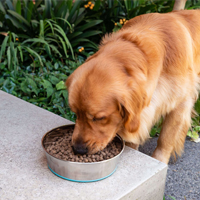
Helping a Dog With Anxiety Issues
This article explains how dogs react to anxiety and stress and share treatment options for helping your dog to relax.Stress has the same harmful effects on your dog’s body that it does on the human body, but all dogs don’t react the same way and the reactions can widely vary too.
Anxiety plays a big role in the health of your dog’s skin, heart, immune system, behavior and emotional well-being.In fact, emotional issues in dogs are frequently related to stress which can lead to much bigger health issues if the stress factor isn’t identified and dealt with in the right way.
Common Stress Triggers for Dogs
Again, there are just as many triggers that cause dogs to worry, as there are for us. Here’s some of the most common causes:
- lack of attention and/or jealousy
- boredom
- lack of exercise
- poor diet or lack of food period
- bad living conditions
- dysfunction and fighting in the home
Your dog’s anxiousness can be brought on by a lack of attention, the same old, same old routine (no variety), boredom, jealousy, lack of exercise (no release of energy), bad living conditions and so on.
All of these issues will impact and and threaten the dog’s immune system. As the stress increases, the immune system becomes over taxed and the potential for bigger health problems start to mount.
The adrenal glands are the body’s natural stress organs and chronic stress places a huge burden on how well they function. The glands wear out reducing the dog’s ability to deal with any additional or new stress. Plus, impaired adrenal glands can also hurt the dog’s immune system. Treatment for anxiety and stress issues won’t always work unless you identify and change the triggers that are causing nervousness for your dog.
Examine Your Dog’s Stress Level
- How does your dog act in his environment? Does he appear relaxed or tense?
- Is your dog happy and content or constantly fearful that something is going to happen? Is he defensive, jealous or angry?
- How does your dog interact with others including other animals?
The above considerations are highly important in determining your dog’s level of contentment or lack of. Dogs who are easygoing, playful, interactive and well balanced will be less likely to develop chronic health problems.
Really take notice to your relationship with your dog as well as other people in the home and any other animals as well. Take notice to your dog’s daily lifestyle. If there is a lot of noise and dysfunction in the home; this can cause just as much major stress and anxiety issues for your dog, as it does for you.
Common Symptoms of Anxiety in Dogs:
- Behavioral issues
- Skin problems
- Pica – eating of nonfood objects
- Vomiting or diarrhea issues
- Lick granuloma caused by the continuous licking of the legs and feet
Here Are Some Treatment Ideas for Correcting Your Dog’s Anxiety
It’s so important that you locate and correct the source causing your dog’s stress.
- One of the first things I recommend trying is Bach Flowers Rescue Remedy. It’s natural, it’s cheap and works well for some dogs and cats for fear of loud noises, separation anxiety, loss of a companion, etc. Read the directions. However, it doesn’t work for every dog.
- If your dog gets stressed by thunder, flooring, fireworks, etc., try using the compression technique which is used for autistic kids. This method often works very well no matter what the source of stress. You can also try combining it with Bach Rescue Remedy.
- Feed a healthy, all-natural diet that includes a good protein source. No chemicals. Poor nutrition stresses the dog’s body. Add probiotics to your dog’s diet to keep his immune system strong. Include some good supplements to cover all the bases of your dog’s health.
- Really take a look at the physical environment in which you expect your dog to live. Do you provide him with a quiet, cozy bed in a quiet room somewhere; a safe place to call his own. Dogs who live in dysfunctional homes with a lot of anger and fighting are very stressed (just like children). It’s critical that you as the dog owner provide a safe, secure place for your dog where he can go on his own and feel safe. Comfort your dog and let him know it’s okay.
- Be reasonable. If you have a 150 pound dog in an apartment and you never exercise your dog, this could be a problem. All dogs no matter what the size need an outlet for their energy. It’s good for mind and body. Stimulate your dog by taking him for a walk everyday and playing with his toys with him.
- Avoid unnecessary drugs which only mask the symptoms and never really get to the root of any health problems. Example: If your feeding your dog a lousy food and not exercising him daily, prescription drugs aren’t the answer.
- Here’s a nice combination of St. John’s Wart and other aids that help to calm stressed or fearful dogs.
- St. John’s Wart provides a calming effect aka a natural antidepressant and mood elevator: Small dogs need 100 mgs. twice daily, large dogs 200-400 mgs. 2-3 times daily depending on large the dog.
- Phenylalanine supplies a series of biochemical transformations that have a positive effect on mood and behavior. Give 2 times daily. Small dogs require 100 mgs. and larger dogs 500 mgs.
- B12 and Folic Acid are both part of the B Complex vitamin family and are vital for the nervous system. Look for capsules which contain 800 micrograms of both B12 and Folic Acid. Small dogs need a quarter capsule and large dogs need a full capsule.
- It’s important to give your dog some variety in his or her life. Mix it up a little! Put him in the car and take him for a nice walk in a park somewhere different. With regards to food, give your dog a nice variety of healthy food as well.
Remember, as much as dogs love routine, they also enjoy a little change in their everyday routine as mentioned in #11.
Also Take Into Consideration
If you’re taking your dog to the vet for a physical problem; don’t overlook the possibility that stress may be a big contributing factor. So, if you’re trying to fix a health issue that could be brought on by stress, but you don’t eliminate the stress trigger, you’re wasting your money at the vet.










